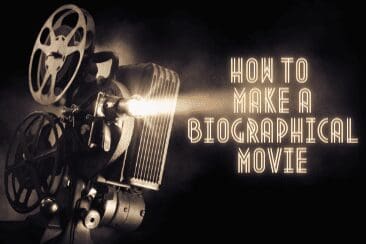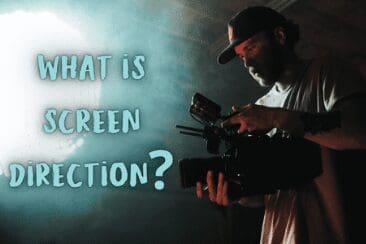
In the world of filmmaking, the director is a key figure. They are responsible for the creative vision of a movie, from the script to the final product. A film director’s job is to bring the story to life on the big screen. From casting to editing, the director oversees all aspects of a movie’s production.
In this article, we will explore the various roles of film directors and the skills necessary to be successful in this position.
Film Director overview
Filmmaking is a process which involves people working in collaboration with the director who has a central role in the creative aspects of the filmmaking process.
They hold the artistic and creative skills of the project and everyone involved is supposed to work in collaboration under their guidance. But, sometimes the environment becomes pressured and difficult to work. This is due to various production issues, restrictions and going over budget, being pretty common.
On the other hand, to be good at the job, a director needs to be well-skilled and informed about the practicalities of the role.
A film director’s duties change as the production of the movie progresses. Initially, they must read and analyze scripts, decide on the overall style of the film, and pick their assistant directors. Once that is complete, they collaborate with other departments such as casting, design, and camera work to bring their vision to life.
What does the Film Director do?
Director’s main responsibilities for a feature film or indie production are as follows:
- Their first duty is to get a script written and secured. A great example of this was James Cameron who held the script of Project Aliens until he was selected as the director to direct that film.
- They are the person who is hired by the producer. Having good credits and a good track record and profile is important.
- A director is interlinked with the production company and remains part of the project throughout the whole filmmaking process. This is where directors such as Ridley Scott, JJ Abrams & Steven Spielberg all own production companies. Many of them will also act as a Producer or Exec Producer for the films they are working on.
Pre-production:
When the director comes on board to begin pre-production, they will work closely with the 1st AD (assistant director), the producer, the production designer, the costume dept, the hair and makeup designer, the DoP (director of photography) the actors and the production office. So it’s fair to say, they have a lot of plates to spin.
The primary responsibilities of the director during pre-production are:
- Keenly reading the script and focusing on its words develops an overall vision of a story. Then, the next step is to convert it into characters that formulate the best vision. If the story is character-based, then the director must drive such actions that are motivating and inspiring.
- The director may request changes be made to the script by the writer. This is if the original story isn’t perfect or there is a need for amendments in any character, situation or location. In the filming process or studio, rewriting is not done by the original writer but by the director.
- After the director has broken the script, the next step is to work on scheduling shooting which is accompanied by 1st AD which is also a breakdown of the script. Shooting does not occur in chronological order. If several scenes are in one place, then they all will be done in a single session to save time and money.
- The casting director works in collaboration with the director and producer and normally manages the auditions.
- The hired cast read through the script in preparation for the filming. They also meet with the director to discuss their vision for specific scenes or characters.
- During casting some directors to give time to rehearse the script while others give this opportunity on set. But, this luxury is not provided by every director.
- In pre-production, meetings with the head of departments are held regularly. This is also dependent on each director’s preferences, as some like to meet while others prefer to oversee.
What does a director do during production?
- Guides through scenes. The director must give positive feedback to the actors on their good performance and guidance after every take to improve them. It is also the job to keep the script at the same stage on which casting is.
- Ensures the job of every department: The director is the person who is responsible for ensuring that every department is doing its job or not. Further, it is a responsibility to provide them with their tasks supported by the head of production.
- Communicate with everyone as much as possible. Frank and direct communication is the key to a successful film. As the direction is collective work, having open communication with team members gives you effective results. It also makes you aware of all the needs across the team.
- Keep the vision alive. To create an artist’s vision, a director must keep their eye on every department.
- The principal of photography: During the film, a director makes 100s of decisions and will ask many questions of the DoP. Both of them will be focusing on photography and what’s going on camera. This can be very stressful due to hectic routines, there are fewer typical days on a shoot, rather, days become long and work is scheduled for the next day.
- Post-production: In post-production, the collaboration of the director with editors, music supervisors, designers and composers. The last stages of production are accompanied by working in editing suites and studios. Along with producer and studio execs, they all make sure that the finished film is as best as it can be, which is then handed over to the marketing and promotional depts to get the film released.
Relationship level of directors with production & crew team:

- Production designer. They become involved in the project at a very early stage even during the first 16 weeks of pre-production.
- Director of photography. Once they’re attached to the project, DoPs spend a day or sometimes a week in the office before shooting. To capture combined efforts in all departments, a strong bond is necessary between the director of photography and the film director. A combined effort is required for the authenticity of sets, props, makeup, dressing etc. This bond will generally result in long-lasting relationships as between the Coen Brothers and Roger Deakins, Steven Spielberg and Janusz Kaminski.
- 1st AD. Probably, the most vital bond onset is with 1st AD. They are the person who is the first hand of the director and is aware of all the discussions of all departments. The hired person has multiple responsibilities to make sure that the director gets what he needs at the appropriate time.
- Makeup designer & costume designer. You will need the maximum amount of time possible to select the designer and manufacture a wardrobe befitting the film’s needs. The director will work with the designer to build up characters during the pre-production period.
Post-Production Phase
Post-production is the last step in creating a film, which can occur both on and off-set. This is the stage where all of the components come together to form the completed product, and directors are heavily involved to guarantee that their vision for the movie is achieved. They collaborate with editors to produce both a director’s cut and a final cut, as well as working with music and sound departments so that their artistic intent is included in the final version of the film – this includes sound effects, background noise, and music that will contribute to each scene.
How to become a film director?

If you are simply beginning out and wish to direct films, you will have to grasp the fact there is no outlined simple path to follow. The one certainty is that if you have the passion, then it’s down to you to make it happen.
That being said, some directors started out as administrators, editors or cinematographers, worked on films and from other directors on set. They then took opportunities as they rose to demonstrate their directorial talents through short films or medium-budget productions.
Get some work experience on set!
Your showreel is your job card and will provide producers and directors with a clear insight into your skill, so work on those short films.
No quantity of networking will go a miss. Network, network, then do some more networking – it’s all about who you know to get your foot in the door. Your playground is the film industry, other aspiring directors, film crew members, film production companies, film schools and film editors.
In addition, try to get hands-on experience in using editors. Source Filmmaker is a free film-making software where you can wear all the hats of a director! You can direct an entire movie using preexisting 3D models of characters from the video game Team Fortress 2. This will be a great playground for you to experience things like framing, cinematography and storyboarding!
Tips on directing actors

Directing actors is a collaborative process from prep to wrap. Keep these things in mind when working with them on set:
Initially:
- Know who you’re working with. It is good to become aware of the actor with whom you are working and have not worked before. It’s good to do your research or speak to other directors to have worked with them before.
- Include them in your process. It is better to make actors aware of how you work and what you expect of them, plan ahead which will help you get a better performance or result
- Create a calm and respectful environment. Don’t raise your voice or shout at actors as it creates unnecessary tension which is against the production environment. Show them as much support as possible.
- Be prepared and be flexible. Keep a clear plan for each scene and be prepared to change and be flexible with any last-minute changes.
- Give them space to work. It is better to talk about every scene during pre-production but at the time of camera rolling, let the actor do their thing. Speak after they have had a good opportunity to perform.
Secondly:
- Don’t make them wait. Punctuality is mandatory. If actors are given a certain time, then make sure that all arrangements are delivered on time
- Be direct. If you demand something from your actors, then be blunt and avoid sugarcoating. Ask them as directly and professionally as you can.
- Avoid results-oriented direction. For example, don’t tell an actor you’d like them to cry at the end of a scene or say things like “I want the audience to feel ___ .” If an actor is only thinking about a result, this may block them from being able to emote and perform organically.
- Be aware of their needs. Be conscious and aware of the needs of actors. Sometimes, actors need an escape from the scene so at that time you should be cooperative.
- Listen to their instincts. If writing does not make sense to an actor or he is facing trouble in getting it, then there should be the option of rewriting that line or scene, which has happened many times before.
What to expect becoming a film director
Film directors typically don’t have steady or guaranteed work, as many of them are freelance. To be taken on by an agent, it’s important to demonstrate your directing capabilities by entering your projects into festivals and competitions for increased visibility.
Salary And Benefits
The U.S. Bureau of Labor Statistics classifies producers and directors as one category under the entertainment and sports umbrella. According to statistics, the median pay in 2019 for this position was $74,420 per year; however, directors are typically paid per project instead of receiving an annual salary. Additionally, some more well-known directors can receive a percentage of their films’ box office earnings.
Finding your style as a film director
Taking on different genres and types of films is a smart way to discover your personal style. As you explore these challenges, draw inspiration from the sources that shape your creative vision, bring life to the characters in your productions, remain true to yourself, and make each film you direct meaningful and unique.
Famous Film Directors
Steven Spielberg
Steven Spielberg is one of the most successful and influential filmmakers of all time. He is best known for directing some of the most iconic and beloved films of all time, including Jaws, E.T. The Extra-Terrestrial, Jurassic Park, Schindler’s List, Saving Private Ryan, and many more. Spielberg is a master storyteller, capable of crafting stories that are both emotionally powerful and entertaining. He has a knack for creating memorable characters and moments that stick with viewers long after the credits roll.
He also has a knack for creating suspense and tension in his films, as well as for his use of special effects and groundbreaking technology. Spielberg is also known for his ability to bring out the best in his actors, often coaxing remarkable performances from them. In addition, Spielberg is also a master of visual effects, creating stunning and realistic visuals that have become iconic in their own right.
Martin Scorsese
Martin Scorsese is an Academy Award-winning film director, producer, screenwriter, and actor. He is best known for his films Taxi Driver (1976), Raging Bull (1980), Goodfellas (1990), The Departed (2006), and The Wolf of Wall Street (2013).
Scorsese’s films are often praised for their technical proficiency, as well as their emotional depth and intensity. He is renowned for his innovative and complex camera work, use of music, and editing techniques, which create a unique atmosphere and tone in his films. He has a knack for creating characters that are complex and layered, and his films often explore themes of violence, crime, and redemption.
Scorsese’s films have been praised for their realism and gritty depictions of urban life. His films often focus on the struggles of working-class people and their attempts to rise above their circumstances. He has also been praised for his ability to create compelling stories and characters, as well as his ability to craft powerful and memorable scenes.
Quentin Tarantino
Quentin Tarantino is an American film director, producer, screenwriter, and actor. He is widely regarded as one of the most influential filmmakers of his generation. He is best known for his films such as Reservoir Dogs, Pulp Fiction, Jackie Brown, Kill Bill, Inglourious Basterds, and The Hateful Eight.
Tarantino’s films are known for their non-linear storylines, dark humour, violence, and pop culture references. He often uses music from the 1960s and 1970s as a way to set the tone and atmosphere of his films. Tarantino also uses a signature style of dialogue, which often features colourful language and profanity. His films often feature ensemble casts of well-known actors, and he often uses violence as a way to make a statement or to create tension.
Tarantino also often focuses on themes of revenge, justice, and redemption. Overall, Tarantino’s films are unique because of their mix of genres, dark humour, violence, and pop culture references.
I hope you enjoyed this article and the tips provided.
All the best, Мusic Gateway Team












